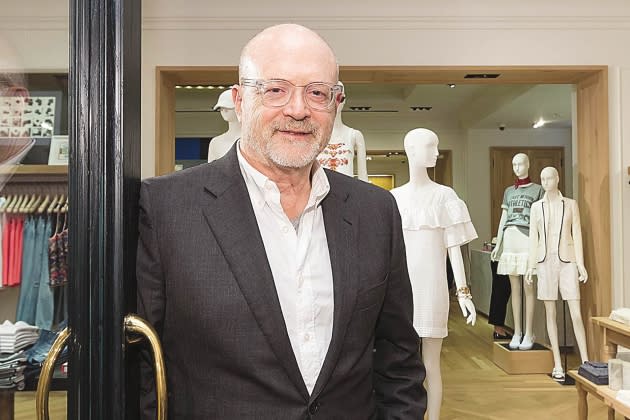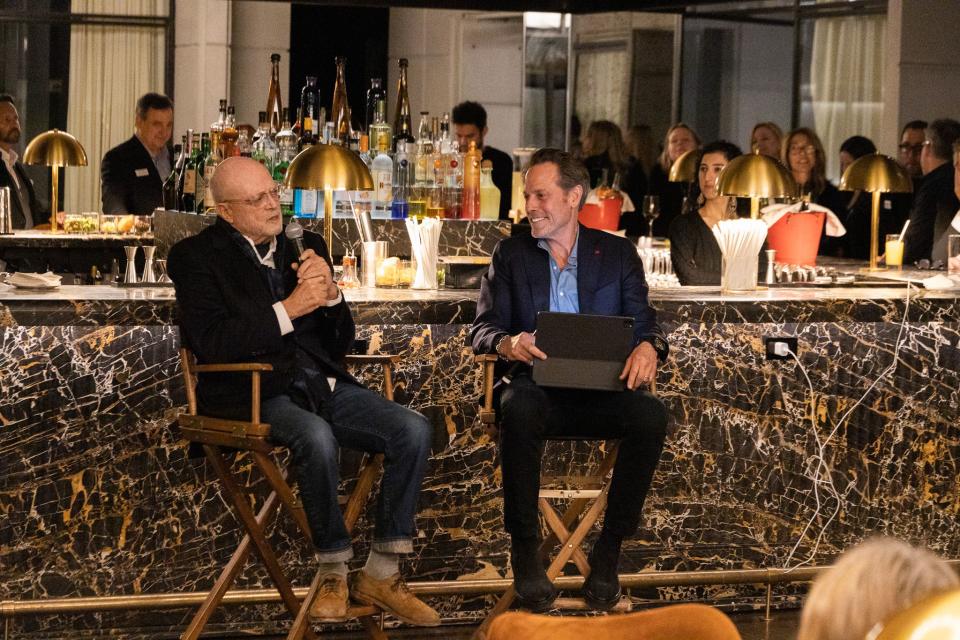Things You Might Not Know About Mickey Drexler
- Oops!Something went wrong.Please try again later.

Appearing on Yahoo Finance Live last year, Millard “Mickey” Drexler disclosed that he discouraged Kanye West, now known as Ye, from partnering up with the Gap.
He said the deal didn’t make sense because West wasn’t a “corporate guy,” and ultimately Drexler was proven right, considering the partnership collapsed in September. But by being candid on Yahoo Finance, Drexler caught heat from certain Gap officials.
More from WWD
So during his “barside chat” at Thursday’s meeting of the World Retail Congress at Spring Studios in Manhattan, Drexler veered from the provocative — he did say he apologized to five people at Gap Inc. after that Yahoo Finance appearance — and instead exposed a more personal side to the crowd of 150 that included several executives that worked for or with Drexler at one company or another.
Among those present was, Ken Pilot, a former Gap executive who remains close with Drexler. As moderator, Pilot managed to keep Drexler, normally expansive and descriptive in conversation, to a mere 40-minute verbal stroll down memory lane.
“Mickey liked to manage by wandering,” Pilot said. “You would be doing your work and all of a sudden you would have a Mickey meeting in your office. The CEO would show up in your office. He would start talking and asking questions about product.” Pilot said Drexler “was everywhere, real and touchable. You never felt Mickey acted like a big shot.”

Thursday’s gathering served to generate support for the next World Retail Congress conference, to be held April 25 to 27 in Barcelona, where it was launched in 2007. The WRC serves as a network for learning and innovation and attracts retail principals globally.
Among the industry figures who came out to hear Drexler were Mindy Grossman, who is the 2023 inductee for the WRC Hall of Fame; former Bloomingdale’s CEO Michael Gould, and current CEOs Gary Sheinbaum of Ashley Stewart, Sharon Leite of The Vitamin Shoppe, Libby Wadle of J. Crew Group, Jason Rabin of Centric Brands, Steve Alan of Steve Alan, Ed Rosenfeld of Steve Madden and Maryanne Grisz of Fashion Group International, as well as Ian McGarrigle, WRC chairman and founder.
Below, snippets from Drexler’s discussion on his life and career, where he describes himself as a kvetch, and acknowledges certain mistakes of “too many goods, too many styles” in an otherwise hugely influential career.
On growing up in the Bronx, N.Y.: “A lot of people there worked in the garment industry. My father worked in the shipping room of a junior coat manufacturer. He was not the easiest person to deal with, but he always made me work….Working weekends, I always touched the goods, I delivered racks of clothing, and didn’t know for not working ever. I worked through my childhood, delivered the New York Times while attending Bronx High School of Science shlepping newspapers up stairs. Part of my growing up was to work. Your childhood life has enormous influence on who you are and what you are. I had a lot of difficulty growing up, in hindsight it was fine, but it kind of gives you certain characteristics for your whole life.”
On his own personality: “I was a very shy, quiet kid. I just did my thing, playing stickball. I had a really strong work ethic. My mom died when I was young. My dad always wanted me to be successful. The DNA I got from him was to get out of the Bronx and try to do what he couldn’t do….I worry. A lot of us have insecurity that people don’t understand. I always run a bit scared, I saw the numbers and the figures, and then I was told today the returns are high and I said, ‘Why are you ruining my day? Why would you depress me at 3 in the afternoon.’ Monday and Tuesday were great days, Wednesday and Thursday were bad days, it’s a very tough environment.”
On the “big shots” encountered at work: “I grew up in very modest circumstances. I didn’t know any big shots. Even today, there are a lot of big shots, they don’t say hello. I worked at Bloomingdale’s, Macy’s, Abraham & Straus and I saw all the big shots and I started to realize, when you are young and you are with these big shots you always think they are big shots because they have these titles. I learned many years later not to….You always look at things in your life that change you. Now I’ve learned that if you are thinking it, it is. You have to trust your own judgment.”
On a most influential mentor: “Katie Murphy, who was the Bloomingdale’s fashion director, for some reason adopted me. She and I went to Europe two or three times a year, visiting factories. She was probably the best executive merchant there, but being a woman in the late ’60s, the guys who ran the company kind of treated [her] not like a serious person.…I learned an enormous amount from her. I was a sweater, swimwear and T-shirt buyer, department 381 and department 383, I remember those years well.”
On learning: “Everyday I am a student. You learn every day and you pick up things every day. I never have a meeting where I don’t learn something from somebody. I learned a lot in 12 years at department stores about what not to do, but Katie was the most influential person in business.”
On the traits important to him: “I like people who are curious, who question, who are not afraid to speak.…I don’t like people who are not nice, not respectful, who are arrogant.”
On getting convinced to join Ann Taylor: “Ann Taylor called me twice, I said no. But I was having dinner with an old friend, and told him I was offered a job at Ann Taylor, a $25 million company just bought by a very bureaucratic corporation. I turned it down, but he said, ‘Take the job.’ You would rather be president of a $25 million company than a vice president of Abraham & Straus.”
On building a great business: “You can not have a great company without great product. People who build great companies have to have vision, and have partners also. I could do none of this without the team here.”
On Steve Jobs: “We got together in 1999. I idolized Steve. It’s a tragedy he’s not living. His reputation is mixed. He worried all the time too. His two happiest days was beating the value of Dell. The second one was the day he beat the value of Microsoft. It was the happiest I’ve ever seen him. He was recruiting me because he was getting into the retail business and he liked what Gap did. He showed me the store design. I thought it was awful, and then we built the store in one of the warehouses. That store is still the [Apple] store of today. He saw around corners. You have to see around corners.”
On technology: “Technology is not what I do. I do marketing, people, product [and] merchandising.”
On running Gap: “The first week was a nightmare. [Founder] Don Fisher said, ‘We are taking a lot of markdowns.’ It’s not easy running a public company. You get knocked down. You get up. You get knocked down, you keep getting up. That’s what I got from the Bronx.”

